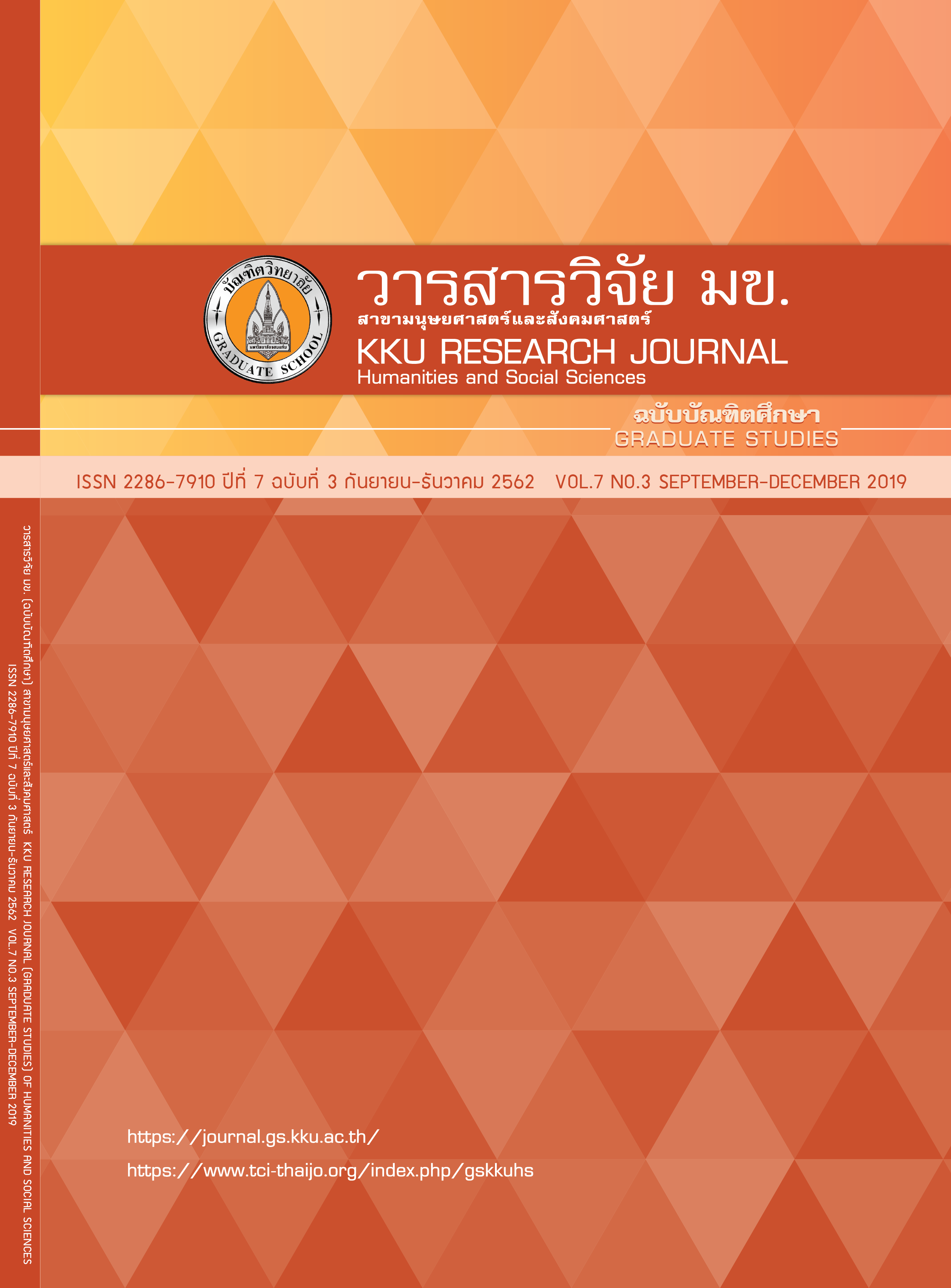กลยุทธ์การนำองค์การสู่ความเป็นเลิศของผู้บริหารสถานศึกษาอาชีวศึกษาเอกชน ในภาคตะวันออกเฉียงเหนือ
คำสำคัญ:
กลยุทธ์การนำองค์การ, ความเป็นเลิศ, ผู้บริหารสถานศึกษาอาชีวศึกษาเอกชนบทคัดย่อ
การวิจัยครั้งนี้มีวัตถุประสงค์เพื่อ 1) สร้างและพัฒนากลยุทธ์การนำองค์การสู่ความเป็นเลิศ และ 2) ประเมินความเป็นประโยชน์ ความเป็นไปได้ ความเหมาะสม และความสอดคล้องของกลยุทธ์การนำองค์การสู่ความเป็นเลิศของผู้บริหารสถานศึกษาอาชีวศึกษาเอกชนในภาคตะวันออกเฉียงเหนือ การวิจัยแบ่งออกเป็น 2 ระยะ ระยะที่ 1 การสร้างและพัฒนากลยุทธ์การนำองค์การ โดยการสัมภาษณ์ผู้เชี่ยวชาญ จำนวน 6 คน แล้วนำข้อมูลมาวิเคราะห์เพื่อสร้างเป็นแบบสอบถาม นำแบบสอบถามที่ได้ไปให้ผู้เชี่ยวชาญจำนวน 21 คนตอบเพื่อยืนยันข้อมูลที่ได้ ระยะที่ 2 การประเมินความเป็นประโยชน์ ความเป็นไปได้ ความเหมาะสม และความสอดคล้องของกลยุทธ์การนำองค์การโดยการสอบถามความคิดเห็นจากคณะกรรมการบริหารสถานศึกษาจำนวน 124 คนตอบ โดยการเลือกแบบโควต้า เครื่องมือที่ใช้ในการวิจัย ได้แก่ แบบสัมภาษณ์และแบบสอบถาม แบบมาตราส่วนประมาณค่า 5 ระดับ โดยแบบสอบถามเกี่ยวกับความเป็นประโยชน์ มีค่าความเชื่อมั่น 0.91 ความเป็นไปได้ 0.95 ความเหมาะสม 0.93 ความสอดคล้อง 0.92 สถิติที่ใช้ในการวิเคราะห์ข้อมูล ได้แก่ ค่าความถี่ ค่าร้อยละ ค่ามัธยฐาน ค่าฐานนิยม ค่าพิสัยระหว่างควอไทล์ ค่าเฉลี่ยและค่าส่วนเบี่ยงเบนมาตรฐาน ผลการวิจัยพบว่า การสร้างและพัฒนากลยุทธ์การนำองค์การสู่ความเป็นเลิศ มี 7 กลยุทธ์ 44 วิธีการ ได้แก่ 1) กลยุทธ์การกำหนดทิศทางของสถานศึกษา มี 5 วิธีการ 2) กลยุทธ์การสื่อสารในองค์การ มี 5 วิธีการ 3) กลยุทธ์การบริหารการเปลี่ยนแปลง มี 5 วิธีการ 4) กลยุทธ์การบริหารความเสี่ยง มี 8 วิธีการ 5) กลยุทธ์ภาวะผู้นำในองค์การ มี 8 วิธีการ 6) กลยุทธ์การตัดสินใจ มี 7 วิธีการ และ 7) กลยุทธ์วัฒนธรรมองค์การ มี 6 วิธีการ และการประเมินความเป็นประโยชน์ ความเป็นไปได้ ความเหมาะสม และความสอดคล้องของกลยุทธ์การนำองค์การสู่ความเป็นเลิศ ความเป็นประโยชน์อยู่ในระดับมากที่สุด ส่วนความเหมาะสม ความสอดคล้อง และความเป็นไปได้อยู่ในระดับมาก
เอกสารอ้างอิง
Retrieved May 23, 2018 from https:sites.google.com/a/opec/nyobay-rmt-sth; 2018.
2. Obama Barak. Remarks by the President on job creation and job training.
Retrieved 11 March 2010, from http://www.whitehouse.gov/the_press_office/
Remarks-by-the-President-on-Job-Creation-and-Job-Training-5/8/09/; 2009.
3. Ministry of Education. Vocational education of China. Retrieved 4 August
2010, from http://www.moe.edu.cn/english/vocational_v.htm; 2010.
4. UNESCO. Technical and vocational education and training for the twenty-first
Century. Retrieved 11 November 2009 from http://www.unesco.org/education/; 2002.
5. Promoting Private Education Committee Office. Private School Act of Parliament 2007.
Bangkok: Private Education Publishing; 2008.
6. Vocational Education Act of Parliament 2008. (5 March 2008) . Government Gazette.
125/43 a page 3; 2008.
7. Office of Secretary of Educational Council 2009. Proposal of Educational Change in
the Second Decade (2009-2018). Bangkok: Prikwan Graffic; 2009.
8. The Office of National Education standards and Quality Assessment
(Public Organization). Automated QA Technology of External Quality Assurance
Retrieved on 2 April 2015 from http://www.onesqa.or.th/SummaryReport.aspx; 2015.
9. The Association of Private Colleges of Technology and Vocational Education of
Thailand. Follow up and evaluate the implementation of policies, tactics, promotion,
education management. Bangkok: Office of the Private Education Commission; 2010.
10. Asawaphum, S. Excellence and Excellence Management. Buabandit Educational
Administration, Ubonrathchathani University Journal. 2016; 16(1): 1-7.
11. Prasertsri, R. Leadership. 2nd ed. Bangkok: Thirafilm and Cytex; 2008.
12. Anatanawi, P. Principles, Concept and Theories of Educational Administration. 3rd ed.
Chonburi: Montri Publishing Company; 2010.
13. Kejornnantana, N. Strategic Management. Bangkok: SE-Education; 2009.
14. Juito, S. Vision and New Trend of Strategic Leadership. Nonthaburi: Sukphothai
Thammathirat Open University; 2009.
15. Chanprasert, N. Guidelines for Private Schools Management by using the
Strategic Leadership in Amphur Muang Khon Kaen Province [Thesis]. Khon Kaen:
Khon Kaen University; 2012.Thai.
16. Sattayanurak, J. The Strategic of Organizational-Culture Chang Management
of Institute of Physical Education. [Dissertation]. Pathum Thani: Rangsit University;
2013. Thai.
17. Steers, R.M. Organizational Effectiveness: A Behavioral View. Santa Monica:
Goodyear; 1977.
18. Hirunchat, N. Administrator’s Role and the Information and Communication
Technology in School. Journal of Educational Administration, Silpakorn University.
2014; 5(1): 36-44.
19. Kotter, J.P. Leading Change. MA: Harvard Business School of Press; 1996.
20. Farlangthong, S. ASEAN Conquest Business Strategy. Bangkok: Expernet; 2012.
21. Supasopon, C. The development of change management model toward the excellence
of public basic education instutions [Dissertation]. Bangkok: Chulalongkorn University;
2010. Thai.
22. Namchiangtai, C. Risk Management in Education Sector. Government Officer
and Educational Personnel Journal. 2009; 29(1): 40-46.
23. Suntarayuth, T. Educational Risk Management. 2nd ed. Bangkok:
Natikul; 2010.
24. Thanomvech, P. Development of Participative Risk Management Model for
Vocational College [Dissertation]. Bangkok: King Mongkut’s University of
Technology North Bangkok; 2015.Thai.
25. Muangsong, K. A Model for Strategic Leadership Development of Administrators
in Basic Education Insititutions. [Dissertation]. Chon Buri: Burapha University; 2007.Thai.
26. Patipan, K. A Structure Equation Model of Creative Leadership for Vocational
College Administrators [Dissertation]. Khon Kaen: Khon Kaen University; 2012. Thai.
27. Juito, S. Organization and management. 17th ed. Nonthaburi: Sukphothai
Thammathirat Open University; 2011.
28. Yavirach, N. Leadership and strategic leaders. 7th ed. Bangkok:
Triple group; 2009.
29. Udta, D. Decision Making Procedure of Private School Administrators in
Phayao Province [Thesis]. Chiang Rai : Chiang Rai Rajabhat University; 2013. Thai.
30. Patterson, J.L, S. C. Purkey and J. V. Parker. Productive School Systems for
a Non-rational World. Virqinia : ACSD; 1986.
31. Serqiovani, T. Leadership: what is in it for school?. Bowker: T
aylor & Francis Group; 1988.
32. Sarasutthana, V. Three-dimensional School Management Professional Development
to Effective Management. 7th ed. Khon Kaen: Klungnana vitthaya press; 2010.
33. Butterworth, C. Leading the way. Occupational Health, 65(11), 22-24. Retrieved on
September 10, 2017 from https://search.proquest.com/docview/1461360723?
accountid=32957; 2013.
34. Vorakanthiwat, P. Strategic Leadership of Private Vocation School Administrators
in Bangkok Metropolitan as Perceived by Educational Administrators and Teachers
[Thesis]. Bangkok: Dhurakij Pundit University; 2012. Thai.
35. Vicitging, V. A study of organizational culture of private schools under the
office of sakaeo educational service area 2 [Thesis]. Chon Buri: Burapha
University; 2009. Thai.
36. Vijittakamaree N. Communication in organization. 2nd ed. Bangkok:
Kasetsart University Press; 2011.
37. Wongthip, S. Keys of Modern Organization Development. Business Administration
Technology of Mahanakorn Journal. 2014; 4(1): 80-97.
38. Phanudom, N. et al. Guidelines for Good Internal Control. Bangkok: Amarin
Printing; 2006.




